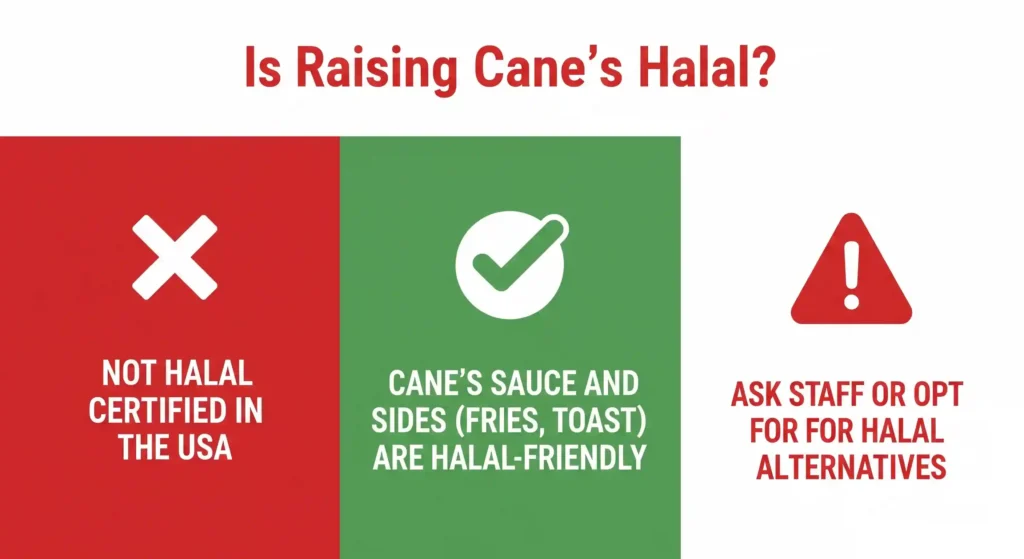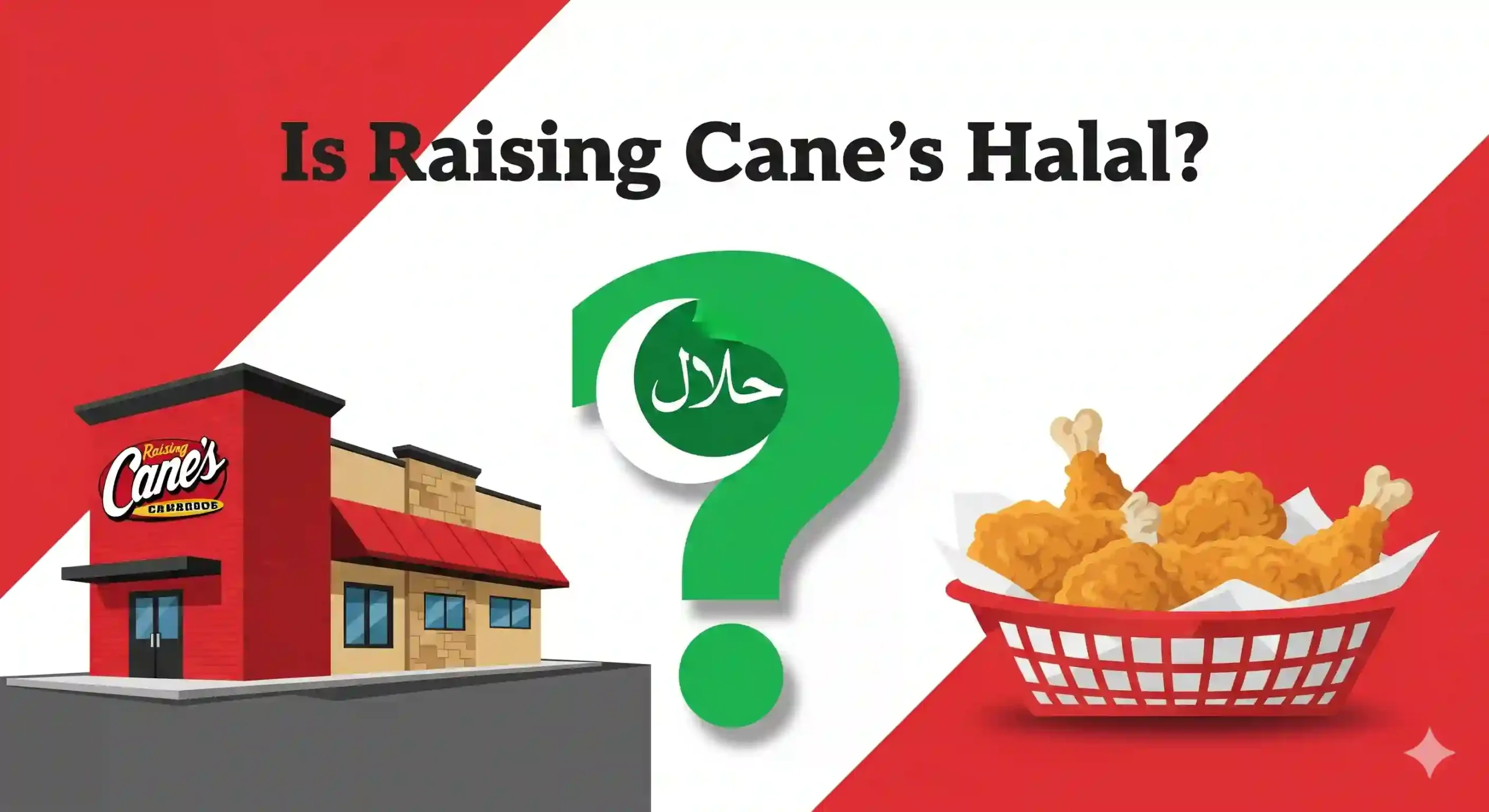Muslim diners often wonder whether Raising Cane’s Chicken Fingers in the USA serves halal food. Officially, no U.S. Cane’s outlet is halal-certified. Inquiries to the company confirmed that “our restaurants and quality Chicken Finger meals are not certified Halal or Kosher” halal.ist. Company representatives even replied that Raising Cane’s purchases chicken from multiple USDA-inspected vendors and “unfortunately, we do not currently have any Halal choices available” thehalalplanet.com. In other words, the chain does not guarantee Islamic-slaughtered (zabīḥah) chicken in the U.S.. (By contrast, its Middle Eastern franchises explicitly source only halal chicken 225batonrouge.com, but those practices do not apply to the U.S. locations.)
Key Certification Facts: None of Raising Cane’s U.S. restaurants carry a halal certificate thehalalplanet.com. The company response made it clear that “we do not currently have any Halal choices available” thehalalplanet.com. Any isolated claims to the contrary (e.g. one Zabihah directory entry for an Illinois store based on staff comments halal.ist) are anecdotal and not official. In short, don’t assume U.S. Cane’s is halal-certified.
Chicken Sourcing and Slaughter Practices
Raising Cane’s emphasizes “100% white breast meat chicken,” but says nothing about Islamic slaughter. Their chickens come from standard U.S. suppliers who follow federal inspection and humane-slaughter rules thehalalplanet.com. These USDA-regulated procedures typically involve pre-slaughter stunning and no explicit Allah’s Name recitation – practices that many Islamic scholars say do not meet halal requirements. In fact, halal-focused analysts note that U.S. slaughterhouses generally do not guarantee Islamically lawful slaughter thehalalplanet.com thehalalplanet.com. Without a halal certificate, Muslims have no certainty that the chicken was handled according to Sharia.
Islamic jurists have debated meat from “People of the Book” countries. An oft-cited fatwa argued that since Americans are mostly Christian/Jewish, U.S. chicken could be permissiblereddit.com. However, many scholars and community members reject that assurance unless halal is certified. As one Muslim commenter pointed out, even if 70% of Americans are “People of the Book,” we still don’t know who actually slaughtered the chicken. It “is the duty of the Muslim to make sure they are eating halal food”reddit.com. In practice, most halal-conscious diners err on the side of caution.
Cane’s Sauce and Other Ingredients
Many Muslims do enjoy non-meat items at Cane’s, and fortunately most other ingredients are halal-friendly. Cane’s signature dipping sauce, for example, contains only mayonnaise (egg), ketchup (tomato, vinegar, spices), Worcestershire sauce (anchovies), garlic, pepper, and salt alphafoodie.com – none of which are haram. (Worcestershire sauce has fish, which is permissible.) Coleslaw dressing, fries (potatoes and vegetable oil), Texas toast (bread and butter), and beverages (lemonade, tea) likewise contain no pork or alcohol. In short, aside from the chicken meat itself, the menu has no obvious haram components.
Figure: A typical Raising Cane’s combo plate includes chicken fingers, Texas toast, crinkle-cut fries, coleslaw and the chain’s special Cane’s Sauce. All of these sides (sauce, fries, toast, slaw) contain no pork or alcohol and are halal-friendly alphafoodie.com.
Key Ingredient Notes: Cane’s Sauce (mayonnaise + ketchup + spices) is halal alphafoodie.com. None of Cane’s sauces or sides have pork-derived gelatin or alcoholic ingredients. Thus, from an ingredient standpoint the only Islamic concern is the chicken’s halal status – not the sauce or vegetables.
Read More:
Cooking Methods and Cross-Contamination Risks
Raising Cane’s kitchens do not cook any pork or alcoholic foods, so cross-contamination with explicitly haram ingredients is very unlikely. Chicken fingers and fries share the fryer, but since everything fried there is chicken or potato, the oil remains halal. The grill/toaster is only used for bread or butter. In practice, no non-halal meat enters the cooking process at Cane’s (unlike, say, a restaurant that also serves pork bacon).
Islamic rulings on cross-contamination confirm that mere doubt about shared cookware does not automatically forbid eating the halal items. Islamweb’s fatwa on mixed menus states: “It is permissible to eat in these restaurants as long as you eat what is lawful in them. This principle cannot be changed to prohibition just because of doubt that they may use the same utensils”islamweb.net. In other words, eating Cane’s chicken and fries remains allowed so long as those foods themselves are halal (and no proven impurity has occurred). However, the scholars caution that if one is certain that a utensil was contaminated by haram meat, then one must avoid eating that food islamweb.net. In Cane’s case, because no pork or alcohol is present on site, there is no known impurity being transferred. Still, some Muslims prefer to avoid doubtful contexts entirely.
Islamic Caution: Classical advice is to “leave that which leads to doubt for that which does not” (Tirmidhi). Many diners therefore avoid Cane’s chicken entirely due to uncertainty. But if no haram was actually used, Islamweb notes that doubt alone is not sin. In fact, scholars explain that “the food which you suspect to be forbidden is lawful in principle”islamweb.net (you need definite proof of haram content before prohibiting it).
Islamic Rulings on Uncertain Meat and Doubt
Islamic law provides guidance on doubtful foods. In general, permissibility is assumed by default unless something is clearly haram. A fatwa on Islamweb reassures: “All kinds of food are permissible in principle… The food which you suspect to be forbidden is lawful in principle” islamweb.net. Thus, if a Muslim unknowingly eats Cane’s chicken believing it was halal, their meal and worship remain valid – there is no retroactive sin or need to invalidate prayer islamweb.net.
However, this permissibility is based on honest belief. Many scholars advise Muslim consumers to seek halal-certified meat if possible. Given any serious doubt, it is recommended to avoid. For example, one knowledgeable practitioner wrote, “It is the duty of the Muslim to make sure they are eating halal food when living in a non-Muslim country” reddit.com. Likewise, the Prophet ﷺ encouraged extra caution: “The best of religion is piety… one must avoid doubtful matters” (At-Tirmidhi). In practice, this means that although Islam does not punish an honest mistake, the safest course is to skip meat of unknown status when alternatives exist islamweb.net reddit.com.

Muslim Community & Social Media Insights
Online Muslim communities largely agree that U.S. Raising Cane’s is not reliably halal. For example, on Reddit’s /r/RaisingCanes one fan bluntly stated, “American locations are not halal”reddit.com (he noted only Middle East branches tend to be halal). Influential halal food blogs echo this uncertainty. HalalRun’s review of Cane’s summarizes: “In the USA, some sources on the web claim that the chicken served at Raising Cane’s is halal… However, [when asked] the chain’s response has been [that it] is not officially halal” halalrun.com halalrun.com. That site urges diners to “always verify the Halal status with the restaurant directly just to be sure”halalrun.com, since franchise practices can differ.
On TikTok and Twitter, many Muslims compare Raising Cane’s U.S. and Middle East outlets. Videos show UAE branches proudly advertising halal menus, while U.S. diners shrug at the lack of certification. Personal anecdotes vary: some say “I eat there all the time and I’m fine”, but others advise caution. Overall, community sentiment is: skip the chicken or proceed carefully. Halal food influencers encourage people to stick to clearly halal items on the Cane’s menu (fries, toast, drinks) and not assume the chicken is halal alphafoodie.com sitehalal.com.
Practical Guidance for Muslim Diners
If you plan to visit a Raising Cane’s in the U.S., here are some actionable tips:
- Focus on Halal-safe items. The fried chicken fingers are the only suspect item. All sides and drinks (crinkle fries, Texas toast, coleslaw, lemonade, iced tea, etc.) contain no pork or alcohol and are halal by nature alphafoodie.com. You can enjoy these without worry.
- Ask the staff about chicken sourcing. Some Muslims call the restaurant or ask a manager if their chicken is halal-certified or from a known halal supplier. The likely answer will be “no,” but this gets you official confirmation thehalalplanet.com halalrun.com. If by chance a local franchise does use halal chicken (rare), the staff should be able to tell you.
- Consider the chain’s caveat. HalalRun reminds us that even if one Cane’s franchise once had halal meat, a new owner might change suppliers halalrun.com. Policies can vary, so always get the latest information.
- Treat the chicken as doubtful. If after asking you still choose to eat the chicken fingers, do so with the intention of being cautious. Say bismillah and remember that, by default, your actions remain valid unless you know for certain the food was haram islamweb.net. In practice, many simply avoid the chicken to follow the Prophet’s advice to leave doubtful matters alone.
- Seek halal alternatives. Especially if halal compliance is very important to you, consider dining at a halal-certified chicken restaurant instead. Across the U.S. there are many fast-food chains or local eateries serving halal chicken fingers or tenders. This is the most reliable way to enjoy chicken without concern.
Summary: Raising Cane’s U.S. locations are not halal-certified, and there is no guarantee the chicken meets Islamic slaughter standards thehalalplanet.com thehalalplanet.com. Aside from the chicken itself, their menu contains no obvious haram ingredients (the famous Cane’s Sauce and all sides are halal-friendly alphafoodie.com). According to Islamic law, if you do eat the chicken unknowingly believing it was halal, it does not constitute a sin islamweb.net. Nevertheless, Islamic scholars and the wider Muslim community advise caution. The consensus is to either skip the chicken or confirm halal status directly with the restaurant thehalalplanet.com halalrun.com. In practice, many observant Muslims simply order only the halal-safe items (fries, toast, slaw, etc.) or visit a known halal-certified chicken spot instead. By combining an understanding of Raising Cane’s practices with Islamic guidance on doubtful foods islamweb.net islamweb.net, Muslim diners can make informed, conscientious choices about eating at Cane’s.

